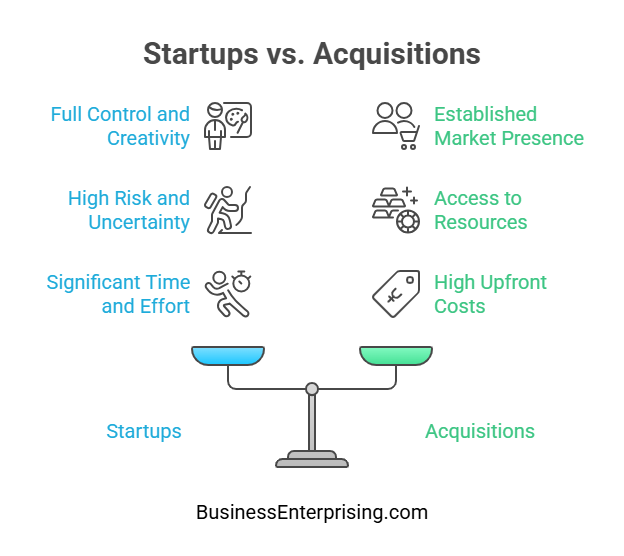 Entrepreneurs sometimes face the decision of whether to start a new business from scratch or acquire an existing one. Both paths offer unique advantages and challenges. This makes the choice complex and highly dependent on personal goals, resources, and market conditions. Let’s explore the pros and cons of startups vs. acquisitions. Below we’ll provide insights into the factors that influence this decision and the demographic trends shaping the current business landscape.
Entrepreneurs sometimes face the decision of whether to start a new business from scratch or acquire an existing one. Both paths offer unique advantages and challenges. This makes the choice complex and highly dependent on personal goals, resources, and market conditions. Let’s explore the pros and cons of startups vs. acquisitions. Below we’ll provide insights into the factors that influence this decision and the demographic trends shaping the current business landscape.
The Appeal of Startups
When considering startups vs. acquisitions, starting a business from scratch is a path filled with excitement, creativity, and a sense of ownership. For many entrepreneurs, the appeal lies in the opportunity to bring a unique vision to life, innovate without constraints, and build a brand from the ground up. Here are some of the key benefits of launching a startup:
Full Control and Creativity
Firstly, starting a business allows entrepreneurs to have full control over their operations, culture, and strategic direction. This freedom to make decisions without inherited constraints is particularly appealing to those with a clear vision and innovative ideas. Entrepreneurs can implement their own processes, create their own brand identity, and build a company culture that aligns with their values and goals.
Market Opportunity
Moreover, startups can capitalize on emerging market opportunities that established businesses may overlook. By identifying niche markets or unmet consumer needs, startups can position themselves as pioneers and gain a competitive edge. The ability to respond quickly to market trends and pivot strategies as needed is a significant advantage in today’s fast-paced business environment.
Potential for High Rewards
Additionally, the potential for high financial rewards is a driving factor for many startup founders. While the risk of failure is high, successful startups can achieve exponential growth and significant returns on investment. The entrepreneurial journey is often fueled by the possibility of creating substantial value and making a lasting impact on the market.
The Challenges of Startups
However, starting a business from scratch also comes with considerable challenges that aspiring entrepreneurs must be prepared to face.
High Risk and Uncertainty
Firstly, the failure rate for startups vs. acquisitions is notably high. According to the U.S. Bureau of Labor Statistics, approximately 20% of new businesses fail within their first year, and nearly 50% fail by their fifth year. This high risk is attributed to factors such as inadequate funding, poor market fit, and operational inefficiencies. Entrepreneurs must be resilient and resourceful to navigate these uncertainties and sustain their ventures.
Significant Time and Effort
Moreover, launching a startup requires significant time, effort, and commitment. Entrepreneurs must wear multiple hats, managing everything from product development and marketing to finance and human resources. The intense workload and long hours can take a toll on personal well-being and work-life balance.
Limited Resources
Additionally, startups often face resource constraints, particularly in their early stages. Limited access to capital, talent, and market expertise can hinder growth and competitiveness. Entrepreneurs must be adept at leveraging their resources efficiently and seeking external support when needed.
The Advantages of Acquisitions
On the other hand, acquiring an existing business offers a different set of advantages that can mitigate some of the risks associated with startups.
Established Market Presence
Firstly, acquiring a business provides immediate access to an established market presence, customer base, and revenue stream. This reduces the uncertainty and time required to build brand recognition and customer loyalty from scratch. Established businesses often have proven business models and operational processes in place, allowing new owners to focus on growth and optimization.
Reduced Risk
Moreover, acquisitions typically involve lower risk compared to startups. By purchasing a business with a track record of profitability and stability, entrepreneurs can make more informed decisions based on historical performance and market data. This predictability can enhance confidence in the venture’s potential for success.
Access to Resources
Additionally, acquiring a business often comes with access to valuable resources, including experienced employees, supplier relationships, and intellectual property. These assets can provide a strong foundation for future growth and innovation. The ability to leverage existing infrastructure and expertise can accelerate the implementation of new strategies and initiatives.
The Challenges of Acquisitions
However, acquisitions are not without their challenges, and aspiring business owners must carefully consider these factors before making a purchase.
High Upfront Costs
Firstly, acquiring a business typically requires a significant upfront investment. The cost of purchasing a profitable and well-established business can be substantial and securing financing may involve complex negotiations and due diligence. Additionally, the buyer may need to invest in improvements and integration efforts to align the acquired business with their strategic goals.
Integration Issues
Moreover, integrating an acquired business into the buyer’s existing operations can be complex and challenging. Differences in culture, processes, and systems can lead to conflicts and inefficiencies. Successful integration requires careful planning, clear communication, and effective change management to ensure a smooth transition.
Legacy Issues
Furthermore, acquired businesses may come with legacy issues, such as outdated technology, legal liabilities, or reputation challenges. Buyers must conduct thorough due diligence to identify and address these potential pitfalls. Understanding the full scope of the business’s strengths and weaknesses is crucial for making informed decisions and mitigating risks.
Demographic Trends in Business Ownership
Demographic trends play a significant role in shaping the current business landscape, particularly in the context of acquisitions. The aging baby boomer population is leading to a wave of business transitions, as many older business owners look to retire and sell their businesses. According to the U.S. Small Business Administration, baby boomers own approximately 2.3 million small businesses, and a significant number of these owners are expected to retire in the coming years.
Conversely, younger generations, including millennials and Generation Z, are showing a growing interest in entrepreneurship and business ownership. These younger entrepreneurs often prefer acquiring existing businesses due to the reduced risk and established market presence. The availability of well-established businesses for sale presents a unique opportunity for younger buyers to step into ownership and drive future growth.
Startups vs. Acquisitions
In summary, the decision between startups vs. acquisitions…starting a new business or acquiring an existing one depends on various factors, including personal goals, risk tolerance, resources, and market conditions. Startups offer the excitement of building something new and innovative, while acquisitions provide the stability and resources of an established operation. Both paths come with their unique advantages and challenges, and aspiring entrepreneurs must carefully weigh these factors to make the best decision for their individual circumstances.
Understanding demographic trends and the current market landscape can also inform this decision. With many baby boomers looking to sell their businesses and younger generations eager to buy, the business acquisition market presents significant opportunities. By leveraging the right resources and making informed choices, entrepreneurs can navigate the complexities of business ownership and achieve long-term success.


